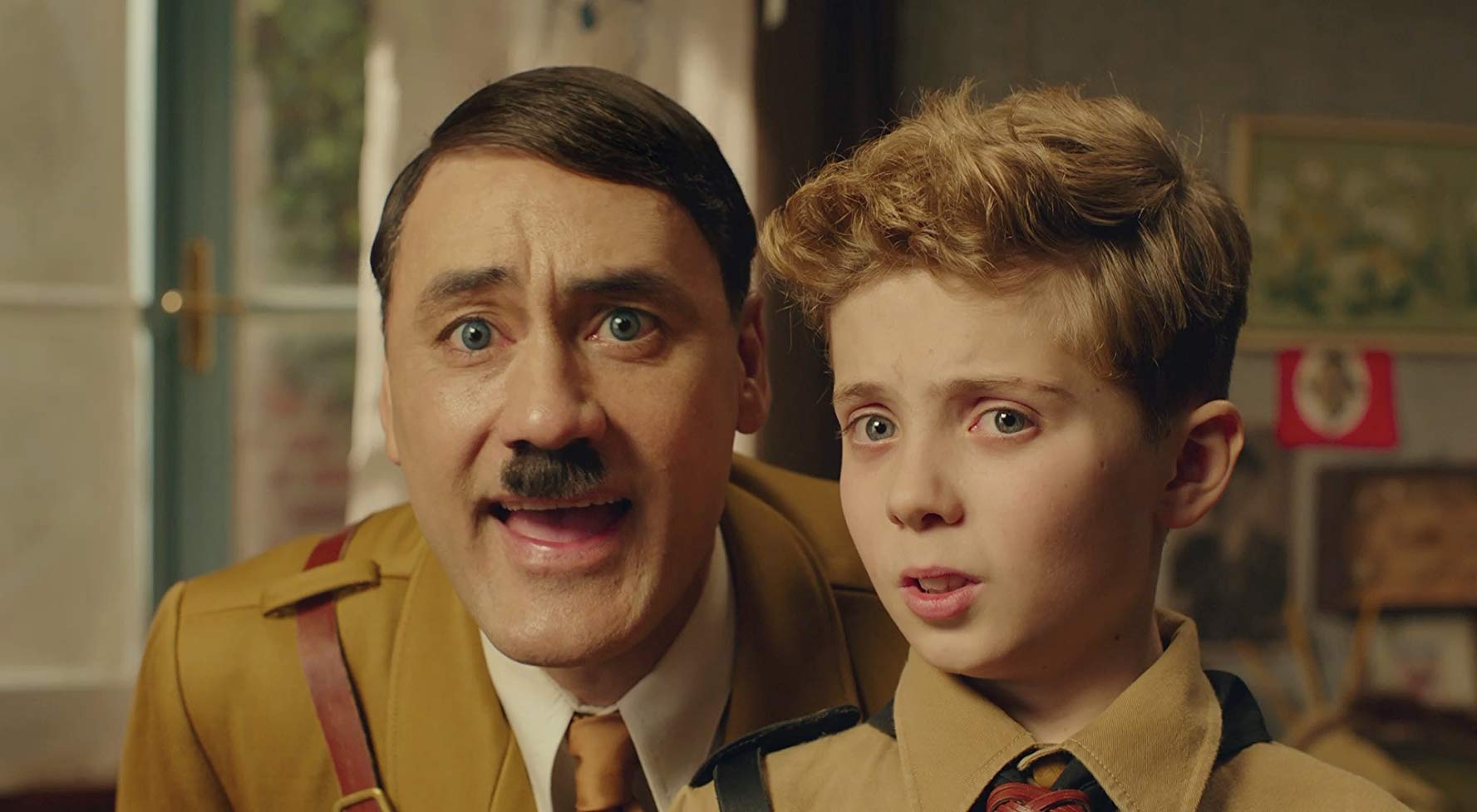Taika Waititi’s self-proclaimed “anti-hate satire” delivers on its promises, a comedic, satirical war drama, that delivers a thought-provoking, and surprisingly deep and emotive cinematic narrative. There were many laughs and even a few unexpected tears shed. The story pulls no punches regarding the concealment of its subject matter and is delivered by a brilliantly cast ensemble.
Waititi’s story centres around Jojo, a ten-year-old member of the Hitler Youth, who follows the Nazi’s with a “blind fanaticism”, evidenced by Jojo’s imaginary friend taking the shape of Hitler (Waititi). The story navigates Jojo proving his loyalty to the ideology he has been brainwashed by, his close relationship with his mother, who despises the war, and promotes the films, “anti-hate” nature, by reminding the audience, that “love is the strongest thing in the world”, and growing up, with the added complications of war, prejudice and death in this unique coming-of-age tale. Jojo develops his first relationship. A girl who happens to be his antithesis, as Jojo discovers his mother is hiding Elsa, a Jew, in their walls.
Waititi’s brilliant script is brought to life by some of the best comedic actors, along with some new faces. Roman Griffin Davis shines as Jojo, he completely inhabits the character with surprising emotional range, and handles a very mature subject matter, with ease and understanding. He makes a child who should be hated, very lovable. It is a travesty that because of his age he will probably be overlooked this awards season, as he delivers one of the best performances of the year. Scarlett Johansson delivers a brilliant comedic performance as Jojo’s mum, Rosie, who is a loving ray of sunshine within dark times. Taika Waititi is brilliant as a ten-year-olds projected image of adult Hitler who tantrums and stomps about and is completely useless. Sam Rockwell delivers another stellar performance as an Army officer who runs the Hitler Youth camp, who through the film’s progression becomes more endearing, as he becomes increasingly disenchanted by Nazi ideology as the majority of his lines are pre-empted by a sigh. The cast works beautifully together, managing to juggle the films light comedic moments, with the darker, tragic reality effortlessly.

This film takes places in one of the history’s most atrocious periods and delivers it in a way that has never really been done within cinema, through the eyes of a child who is absolute in his support of Nazi’s. Waititi demonstrates this brilliantly within Jojo and Elsa’s interactions as she reiterates Nazi propaganda, where Jews are “demons”, who could turn into “bats” and had “horns”, and were truly uncanny to the Aryan race. The audience laughs at her recapitulation of Nazi opinions, and the gullibility of Jojo who takes these ridiculous beliefs as fact. Waititi teases out deeper narrative messages, transporting the audiences to the present where they are also, in danger of believing that anything we read is a fact in this era of ‘fake news’ and stresses the importance of deciphering fact from fiction. The film is self-reflective of the message it’s telling, as the audience laughs at the hilarity of Elsa suggestions, but also experience guilt for laughing at what were genuine beliefs. The film has received criticism for making this period comedic. The comedy is used to submerge the audience into the narrative which, let it not be forgotten, is told from the perspective of a child, it has to be funny and creative. It eases the audience into the subject allowing for the films important messages to be fully understood as comedy engages the audience fully within the film’s narrative. Furthermore, Nazi’s have been mocked in cinema from the 1930s. Charlie Chaplin’s The Great Dictator, makes Hitler an idiotic figure. Waititi is very aware of his subject matter, as there are some truly shocking moments of stark juxtaposition between the fantasy of Jojo’s world and the reality, as there are public hangings of German civilians, battles in Jojo’s town and child-soldiers. However Waititi brilliance comes from seeing the world through a child’s black and white gaze, of right and wrong, but the film’s conclusion leaves the largely adult audience to question whether their own judgments, diverges much from that of the simplicity of a child.
Jojo Rabbit feels like a film where the director is almost angry that the film is having to be made. That within the twenty-first century, and not too long after these atrocities have been committed, society is in danger of allowing these evils to rise, in spite of all promises being made, as seen in America in the rise of Neo-Nazi’s, following Donald Trump’s presidency. The film serves to undermine these people, as nothing more than narrow-minded bumbling fools, who are ridiculous and unfeeling. Waititi has taken the form he is best-known for, and elevated it to new heights, by using it not solely for laughs but the transmission of deeper messages, transmitting his desires for people to “spread more love and less hate.” Waititi’s script is the manifestation of everything that cinema allows directors the creative freedom to do, to take a current issue, reflect it to a period in history and show a farcical nature that makes their ideology, beliefs and leaders into objects of ridicule. Whilst this film is controversial, it is (sadly) undoubtedly the most important film of the year.
Image Credit: IMDb

